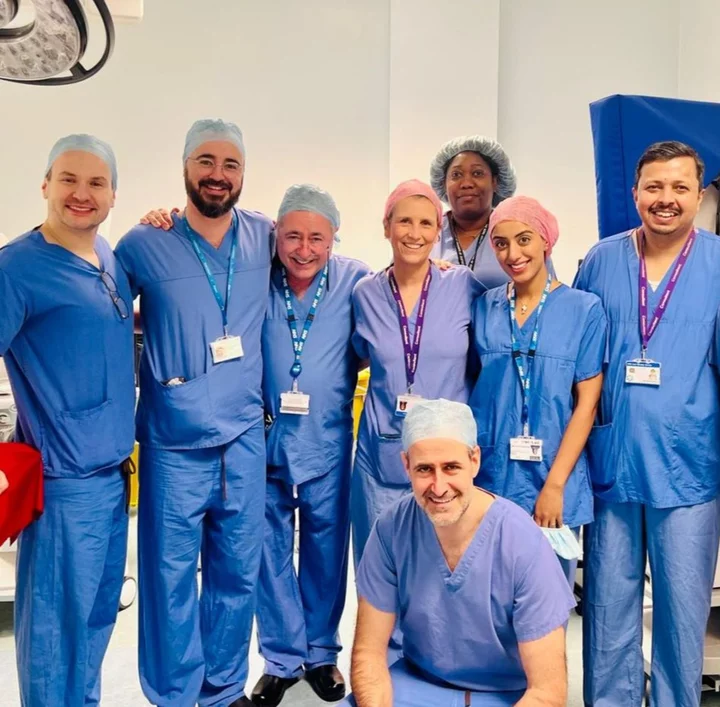
Riders in various states of undress cruise Philadelphia streets in 14th naked bike ride
Hundreds of riders in various states of dress -- or undress – are riding through some of Philadelphia’s main streets for the 14th Philly Naked Bike Ride
2023-08-27 06:25

2 sex workers describe 'violent' encounters with Gilgo Beach suspect, official says
Two women held in Suffolk County jail say they had encounters with accused Gilgo Beach serial killer Rex Heuermann, describing the meetings with him as "violent" and "aggressive," sheriff's department spokesperson Vicki DiStefano said Thursday.
2023-08-26 03:54

Andrew Tate prosecution files reveal graphic claims of coercion ahead of trial
Romanian prosecutors' files, seen by BBC, allegedly show the influencer coercing women into sex acts.
2023-08-23 13:17

How did surgeons carry out Britain’s first womb transplant?
Surgeons worked all day and into the night to ensure Britain’s first womb transplant went smoothly. Its success is down to meticulous research, years of sharing knowledge between experts around the globe, and the hard work and dedication of doctors Professor Richard Smith, from Imperial College London, and Isabel Quiroga, from the Oxford Transplant Centre. Around 50 babies have been born worldwide as a result of womb transplants, which give women missing a functioning uterus a chance to have a baby. In the first UK case, the operation to remove the womb from the recipient’s 40-year-old sister lasted eight hours and 12 minutes, with surgeons leaving her ovaries behind to prevent pushing her into early menopause. One hour earlier, surgeons began operating on the 34-year-old recipient, preparing her body to receive the donated organ. This operation lasted nine hours and 20 minutes, with the surgical team experiencing some difficulties including a higher-than-expected blood loss of two litres. However, after just 10 days, the recipient was well enough to leave the hospital and has continued to have a good recovery. She is also having regular periods, which shows the womb is working well. Her sister was discharged five days after her donor operation and has also made a good recovery. Removing a womb is a similar operation to a radical hysterectomy, according to Prof Smith, who as well as being a gynaecological surgeon is the clinical lead at the charity Womb Transplant UK. He and Miss Quiroga led the team of more than 30 staff who worked on the transplant one Sunday in February. Prof Smith and Miss Quiroga removed the older sister’s womb, cervix and fallopian tubes, plus crucial blood vessels around the organ. The main vessels are the uterine arteries running into the womb, but the surgeons also aimed to collect some of the larger internal vessels that lead into the smaller branch of the womb. Prof Smith said surgeons doing these operations have to retrieve veins involved in the drainage of the womb. “One of the amazing things is that my surgical skill-mix as a cancer surgeon is to remove organs with a margin of normal tissue, while sealing the vessels as I go,” he said. “Transplant surgical skills are different – that is to remove a normal organ with the best number of non-sealed vessels as you can. “Isabel and I operate together with no ego – it just flows backwards and forwards across the table.” He added: “The day itself was truly humbling. We turned up at 7am at the Churchill transplant centre with the donor and the recipient families, then we went into a pre-op huddle. Those in the huddle included surgeons, nurses, anaesthetists and technicians. Prof Smith and Miss Quiroga worked to remove the womb, before the organ was prepared for transplantation by a “back table” team. “This was an organ which had a very, very unusual blood supply,” Prof Smith said. “In fact, it had a set of blood vessels which I’ve never seen in my entire career. They made my dissection a bit harder than it might have been, but we got there.” In the theatre next door, one hour before the retrieval of the womb was completed, surgeons began to operate on the donor’s younger sister to enable her to receive the womb. Prof Smith and Miss Quiroga switched from donor to recipient and Prof Smith removed the vestiges of the underdeveloped womb the recipient was born with. Meanwhile, the organ was packed and transported between the two theatres under sterile conditions to prevent contamination. A sterile bag with a cold perfusion solution contained the womb, which was then placed into a container with ice. During surgery, ligaments attached to the womb were attached to the recipient to help the womb stay in a relatively fixed place so it does not move around the pelvis. The most important part of the transplant operation was the joining of the very small vessels that give the blood supply to the womb. This was the most delicate and difficult part of the operation and was led by Miss Quiroga. Once all the vessels were connected, the donor’s vaginal cuff – around a 1cm part – was stitched into her sister’s vagina. If and when the recipient is able to complete her family, the womb will be removed six months later to prevent her from needing immunosuppressants for the rest of her life. Prof Smith said: “We know that the chance of failure at the point where the uterus goes in – if you look at the world literature – is 20 per cent to 25 per cent. And that failure is usually on the basis on sepsis and thrombosis. So technically, we are up to the job, but what happens thereafter can be scary. “Once you get to three or four days later, the chance of failure drops to probably less than 10 per cent. “Once you get to two weeks – and at the point where the woman has a period – the chance of her having a baby at that point is very high and the chance of failure has dropped to low. But those first two weeks – it’s very scary as a surgeon to watch and wait.” Biopsies to check the womb was functioning were read in London but then also confirmed by an expert team in the US at Baylor University Medical Centre in Dallas, where other womb transplants have been performed. Prof Smith said the procedure gives new hope to women born with devastating conditions. He said: “You’ve got girls, maybe 14, who have not had periods, they go to the GP and a scan shows there is no uterus. Absolute catastrophe. “Up until now, there’s been no solution for that, other than adoption or surrogacy... That’s not the case now. It’s really exciting.” On whether transgender women may also benefit from the operation, Prof Smith said that was still a long way off. He said the pelvic anatomy, vascular anatomy and shape of the pelvis are different, and there are microbiome issues to overcome. “My own sense is if there are transgender transplants that are going to take place, they are many years off. There are an awful lot of steps to go through. My suspicion is a minimum of 10 to 20 years.” Miss Quiroga said the living donor programme to date in the UK has focused on women with relatives who are willing to give their wombs. “It will come to a point where we will have friends or altruistic donors, like we have with many other transplants, but at the moment we’re only focused on people who have come forward with relatives,” she said. Read More Bursts of activity that make you huff and puff ‘linked to reduced cancer risk’ Fiona Phillips, 62, reveals she has Alzheimer’s disease Woman has all her teeth removed after rare vomiting condition causes them to fall out Bursts of activity that make you huff and puff ‘linked to reduced cancer risk’ Fiona Phillips, 62, reveals she has Alzheimer’s disease Woman has all her teeth removed after rare vomiting condition causes them to fall out
2023-08-23 07:16

The Best Accessible Vibrators For People With Disabilities
When it comes to sexual pleasure, disability is rarely part of the conversation. In the long lists of "best vibrators" most (if not all!) overlook the needs of those living with disabilities. One in four adults in the United States has a disability, and their right to orgasm with ease is at the top of our sex-positive crusade. So, when scouring the internet for the best accessible sex toys, we took everything from chronic pain to limited mobility to decreased sensation and increased fatigue into account. Because experiencing sexual pleasure is a right for anyone who wants it — and it definitely shouldn't be gatekept by non-disabled people.
2023-08-22 00:26

What you need to know about menopause, as the UK’s first education programme announced
The UK’s first menopause education programme is in the works. Those behind the National Menopause Education and Support Programme said they hope it will give women reaching menopausal age a better understanding of changes happening in their bodies, as well as peer support from others going through a similar experience. Across a number of weeks, those taking part will be given independent, up-to-date and evidence-based menopause education, including symptoms and treatments, in a course delivered by trained healthcare professionals. Research has shown that women are currently poorly educated about the menopause and often go into it not understanding what to expect Professor Joyce Harper The course, designed by experts at University College London (UCL) and leading women’s health charities, has been inspired by those offered by the National Childbirth Trust (NCT) during pregnancy. Work on developing the programme will begin at UCL in September and those behind it hope it is something which companies can offer to employees. Research published earlier this year by Professor Joyce Harper, who is leading the programme, has suggested that of the 829 postmenopausal women questioned, 90% were not taught about the menopause at school and 60% only started looking for information about it when they began to have symptoms. Harper, a professor in the Institute for Women’s Health at UCL, said they want to help women access the information they need “to manage the changes they experience in this part of their life, in the best way possible”. She said: “Research has shown that women are currently poorly educated about the menopause and often go into it not understanding what to expect. “Some menopausal symptoms can cause psychological issues and women may mistake their symptoms for mental health issues or other concerning causes, and this can have a negative effect on their wellbeing.” Harper said they want to “keep the price of the programme low to make it accessible to everyone” and plan to work with firms so they can make it available to employees. The programme is in partnership with the charities Wellbeing of Women and Sophia Forum, and is supported by the Royal College of Obstetricians and Gynaecologists and British Menopause Society. We hope this work will empower a generation of women to understand the changes to their bodies during menopause Janet Lindsay Janet Lindsay, chief executive of Wellbeing of Women, said: “Every woman deserves access to high-quality information and menopause support, yet as research from Professor Harper shows, too many women haven’t been given the knowledge they desperately need and deserve. “We hope this work will empower a generation of women to understand the changes to their bodies during menopause and access help to manage their symptoms.” Here are the key things to know about menopause. What is it? According to the NHS, menopause is when a woman’s period stops due to lower hormone levels. This usually occurs between the ages of 45 and 55, but it can begin earlier in life. Menopause can happen naturally or because of the removal of the uterus or ovaries, chemotherapy, or due to genetics. But sometimes there’s no real explanation. What are the symptoms? Menopause affects women in different ways. You could have some symptoms, none, or experience them months or years before your period actually stops – this is known as perimenopause. According to the NHS, common mental health symptoms include changes to your mood, low self-esteem and brain fog. Physical symptoms could include hot flushes, insomnia, heart palpitations, migraines, muscle and joint pains, weight fluctuation, dry and itchy skin, reduced sex drive, vaginal dryness and pain, and repetitive urinary tract infections (UTIs). Symptoms can last for months or years, and change or develop over time. What can you do about it? The NHS recommends seeing a GP or nurse if you think you have perimenopause or menopause symptoms, or a pharmacist for advice about treatments and things you can do to help. Positive lifestyle changes such as getting plenty of rest, eating a healthy diet and exercising can help with perimenopause and menopause symptoms. The primary medicine treatment is hormone replacement therapy (HRT), which can help ease symptoms and is prescribed by a doctor. Read More Charity boss speaks out over ‘traumatic’ encounter with royal aide Ukraine war’s heaviest fight rages in east - follow live How to create the mermaid eyes beauty look that’s trending on TikTok How to force bulbs to flower at Christmas How do you choose the best sports bra for you? Experts explain what to look for
2023-08-21 17:53

Michael Jackson: Sexual abuse cases against star's estate can be revived, court docs show
Wade Robson and James Safechuck -- two men who have long alleged that the late Michael Jackson sexually abused them when they were children, and who were featured in the 2019 documentary "Leaving Neverland" -- are now able to revive their since-dismissed lawsuits against Jackson's estate, according to a court opinion filed on Friday and obtained by CNN.
2023-08-20 06:28

21 Vibrators That’ll Hit The G-Spot
If you're still referring to the G-spot as "elusive" or "mythical," it's time to get with the times. Located behind the pubic bone, the G-spot is incredibly real and can be an integral part of many people's ability to reach climax. That's because the G-spot is actually made up of a series of glands and ducts that connect to the back of the clitoris. In layman's terms? Using a G-spot vibrator is just a new (deeply fun) way to stimulate the clit from a different angle.
2023-08-19 00:15

Paramount decides it won't sell majority stake in BET Media Group, source tells AP
BET won’t be sold after all: Paramount Global decided against selling the majority stake of the network
2023-08-18 10:48

US Marine charged with sexual assault weeks after missing teen was found in Camp Pendleton barracks
A US Marine at California's Camp Pendleton has been charged with sexual assault weeks after a missing 14-year-old was discovered in the military base's barracks, according to a charging document.
2023-08-17 16:45

Joe Rogan criticizes teachers advocating for 'cartoon pornography' and radical gender ideology in schools: 'Real creepy'
Joe Rogan said, 'Some of them think that they have a job to do, to remove the programming of the parents that they don’t agree with'
2023-08-17 16:16

Meet Squish: Unbound’s New Clitoral Stimulator That Lets You Take Control
Clitoral stimulation is great (obviously). For most people who have clits, getting it involved is the surest and fastest way to an orgasm. That makes sense, since the clit has thousands of sensory nerves — some extending 5 inches or more in the body. Though that sounds amazing (and it is!), it’s also a lot of sensation to mine from a single organ, and it can make getting to your perfect level of arousal somewhat tricky. Depending on your unique body, that extensive network of nerves can require different levels of stimulation to reach climax, which is why we frequently find ourselves browsing the best clitoral stimulators out there, just to see what new device can help us get our most satisfying orgasm. However, we’ve been the victim of vibrations that are too soft — and leave us wanting — or too hard, jackhammering us to oversensitivity or sucking our soul to throbbing discomfort. Like Goldilocks, we want it to be jusssst right.
2023-08-17 04:53
